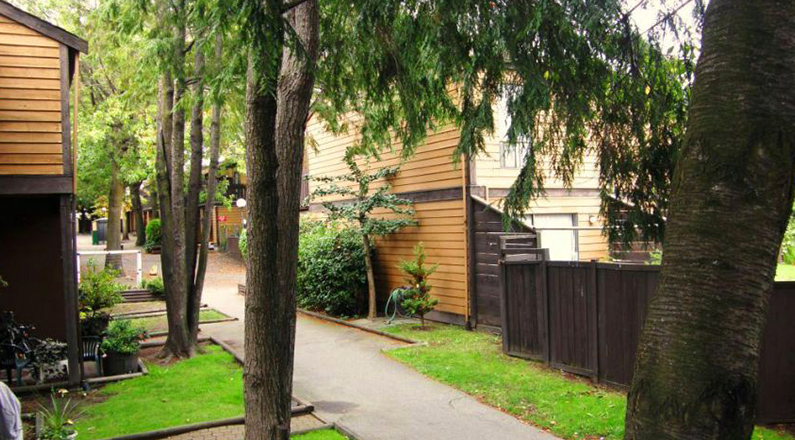|
Home |
About |
Top 10 Lists |
Newsletters |
Events |
Links |
Contact
2015 Top10 Watch List
Full List |
< Back |
Next >
#4/ Marine Garden’s Townhouses: Mid-century Housing Innovation

Photo: Marine Garden's Townhouses (1974), SW Marine Drive & Cambie Street, designed by architect Michael Katz and landscape maven Corneilia Oberlander. Photo by CityHallWatch
In 1976 the world came to Vancouver to experience Habitat ’76, the United Nations conference on housing. Habitat ‘76 was a United Nations-sponsored conference that brought together figures like Buckminster Fuller, Margaret Mead and Mother Teresa to discuss and explore human living conditions and social justice.
Featured during this conference was the Marine Gardens townhouse complex at Southwest Marine Drive and Cambie Street. Designed in 1974 by architect Michael Katz and landscape maven Cornelia Oberlander, the complex was a utopian example of how to provide dense living (45 units/acre) while maintaining a caring community and generous tree-filled public spaces for families to play in.
Since then, this model has demonstrated how livable this community is; 70 family-sized units available at an affordable price have provided space for many families to grow. This fragment of a more visionary time will soon be demolished in favour of two anonymous glass towers.
What is the threat to Marine Gardens?
While Marine Gardens is a high-profile example of this housing typology, similar complexes are also under threat across Vancouver. The townhouse cooperatives along Northeast False Creek created as a part of the Granville Island redevelopment in the late 1970s and early 1980s are reaching a critical period in their lifecycle.
Mortgages and building operations that were formally supported by the federal government are expiring and need to be renewed. Deferred maintenance concerns need to be addressed, and upgrades carried out, to preserve these unique experiments in housing and community living.
BC Housing’s recent decision to sell numerous affordable housing complexes to enterprising non-profits is another part of the problem. Of particular interest to Vancouverites are the townhouses and towers located in the Strathcona area including Stamps Place and Maclean Park complexes. These complexes were built in the 1970s and 1980s as a part of the redevelopment of Strathcona, and stand as both good and bad reminders of that time, while today providing affordable housing and community to lower income families.
The sale of these complexes may lead in the mid and long-term to their redevelopment; the DTES area plan recently passed by the City includes provisions for dramatically increased density on these sites that would only be possible through demolition and redevelopment.
Why is Marine Gardens significant?
The Marine Gardens complex was built as a private development by an enlightened developer, and represents a distinctly mid-1970s brand of optimism and utopianism.
Similar complexes were built across Vancouver and Canada starting in 1968, partially due to the support of the Canada Housing and Mortgage Corporation, which had at the time a city-oriented housing policy. Today these developments are still providing spacious, affordable homes for families in Vancouver and across Canada.
Housing complexes like Marine Gardens are not always charismatic heritage properties and due to deferred maintenance can appear run down. They sometimes have important histories, as is the case with Marine Gardens, but more frequently they have been witnesses to the ordinary lives of families and the communities they engender and as such are critical to establishing a feeling of place and security. In some cases, generous green spaces and community amenities are available that would not be possible given current pressures on land value and density targets.
Without immediate action by the residents and all three levels of government, these reminders of a more enlightened time will start to decay. This is particularly important in a city that is suffering from a housing affordability crisis, and that desperately needs senior levels of government policy assistance.
What you can do
- Contact your local MLA or MP and express your concerns about the lack of supportive provincial and federal housing policies and funding.
- Contact your local MLA and express your concerns about the sale of historic BC Housing complexes.
- Contact Metro Vancouver and Mayor and Council to request the City of Vancouver provide incentives for the retention and upgrading of innovative mid-century complexes.
- Research and share the history of your housing complex.
Resources/Updates
Further reading:
Island in the Creek, Catherine Gourley. Harbour Publishing 1988
Strathcona: Vancouver’s First Neighbourhood, John Atkin. Whitecap Books Ltd 1994.
“Unearthing Vancouver’s forgotten utopian UN conference, Habitat ’76”, Peter Tupper. August 8, 2011
this.org/magazine/2011/08/08/habitat-76-lindsay-brown/
Marine Gardens (video) Public Hearing, Feb 24, 2015:
“A model community of affordable rental housing at risk. What now, what next?”
Posted on February 22, 2015 by urbanizta
cityhallwatch.wordpress.com/2015/02/22/marine-gardens-video/
“Marine Gardens tenant relocation is most expensive of its kind, a challenge for city of Vancouver and developer”
Jeff Lee, Vancouver Sun January 28, 2015
http://bit.ly/1ArcXmA
“Habitat Forum 76”, Lindsey Brown
habitat76.ca/
|

